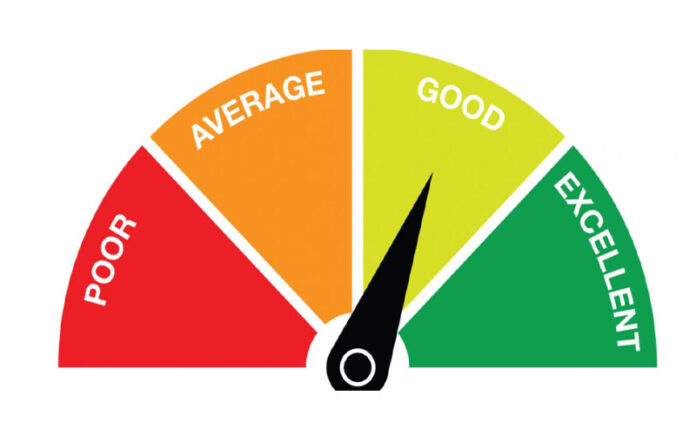Your credit score is one of the most important numbers in your financial life. It can determine whether you get approved for credit cards, loans, mortgages, and more. A good credit score can save you thousands of dollars in interest rates, while a bad score can make borrowing very expensive.
In this guide, we’ll explain what credit scores are, why they matter so much, and how you can improve yours over time. Read on to learn how to leverage credit scores to unlock better financial opportunities.
What Is a Credit Score?
A credit score is a three-digit number calculated based on your credit history and activity. It ranges from 300 to 850, with higher scores indicating lower credit risk.
Lenders use credit scores to quickly assess how likely you are to repay debts. People with higher scores are viewed as more responsible borrowers who are less likely to default on loans.
Your score is determined by the information in your credit reports from the three major credit bureaus: Experian, Equifax, and TransUnion. Key factors that influence your score include:
- Payment history – Have you paid your bills on time? Late payments can lower your score.
- Amounts owed – This considers how much you owe on loans and credit cards versus your credit limits. High balances hurt your score.
- Length of credit history – A longer history with accounts in good standing boosts your score.
- Credit mix – Having different types of credit (mortgages, credit cards, auto loans, etc.) helps your score.
- New credit applications – Too many new accounts in a short period can lower your score.
Monitoring your credit reports and scores from all three bureaus provides the full picture of your financial reputation with lenders.
Why Your Credit Score Matters
Your credit score affects so many aspects of your financial life. Here are some of the key benefits of maintaining a high score:
- Lower interest rates – The higher your credit score, the lower interest rate lenders will offer you on credit cards and loans. This saves you significant money over time.
- Better approval odds – You’re more likely to be approved for new credit if you have a solid credit score, versus being denied if your score is poor.
- Increased borrowing power – A higher score allows you to borrow larger amounts. This flexibility helps if you want to finance a car or home.
- Improved credit terms – Lenders offer borrowers with good scores better rewards programs, lower fees, and more desirable account features.
- Lower insurance premiums – Insurers may use your credit-based insurance score to determine your rates. A good score can mean lower premiums.
- Better employment prospects – Many employers check credit reports as part of background checks. Good credit shows financial responsibility.
- Easier security deposits – Landlords and utilities often require higher deposits from applicants with poor credit. A solid score requires lower (or no) deposits.
The bottom line? Maintaining a high credit score saves you money while opening up better financial opportunities.
How to Check Your Credit Score
The first step is knowing where you stand by checking your latest scores. Here are some options:
- Get free credit reports annually – You can order one free report from each of the three major bureaus every 12 months at annualcreditreport.com. These reports include credit scores.
- Check scores through credit card issuers – Many card companies provide free access to your FICO credit scores on monthly statements or online portals.
- Use third-party credit monitoring services – Companies like Credit Karma provide free credit scores and reports if you sign up for an account. Paid services like MyFICO offer additional score reporting features.
- Purchase scores directly from bureaus – The bureaus sell credit scores directly to consumers for a fee. Experian’s FICO score costs $24.95 for one report and score.
Check all three of your credit reports at least annually and monitor your scores from multiple sources regularly. This helps you detect errors or suspicious activity early so you can correct any issues.
How to Improve Your Credit Score
Building credit takes time and responsible financial behaviors. Here are smart tips to improve your credit score over time:
- Pay all bills on time – Payment history has the biggest impact on your score. Set up autopay or reminders to avoid missed payments.
- Lower credit utilization – Keep balances low compared to limits on credit cards and revolving accounts. High utilization hurts scores.
- Avoid opening too many new accounts – New accounts lower average account age which can impact scores temporarily. Space out new applications.
- Mix credit types – Use a blend of installment loans (mortgages, student, auto) and revolving accounts (credit cards) to demonstrate long-term financial health.
- Check reports and dispute errors – Incorrect negative information can drag down your score. Submit disputes to bureaus to correct any errors.
- Become an authorized user – Being added as an authorized user on a spouse or parent’s old account with good standing can help scores by increasing average age of accounts.
- Limit hard inquiries – Too many credit checks from new applications can lower your score temporarily. Only apply for credit you need.
With responsible credit behaviors and financial prudence over time, you can build and maintain solid credit. Monitor your reports and scores periodically so you understand how your borrowing and payments influence your financial reputation with lenders.
Leveraging Credit Scores for Better Opportunities
A good credit score opens doors to more affordable financing options that create long-term savings and provide greater financial flexibility.
Here are steps to leverage your score for better rates and terms:
- Review your reports and scores – Identify any negative factors dragging your score down that you can proactively improve.
- Check offers pre-qualified for – Banks share pre-qualified offers only with consumers who meet credit standards. See what credit products you already likely qualify for based on your score.
- Talk to lenders – Discuss opportunities to refinance loans or credit cards at lower interest rates based on your improved credit situation. Avoidborrowing more than you need.
- Negotiate better rates and terms – Inform utility companies, cable providers, insurance companies, and cell phone carriers that you have excellent credit and request discounted premiums or waived fees.
- Lock in low rates – Time applications for credit cards and loans when your credit score is at its peak so you can lock in the best rates for the long-term.
A strong credit score is a valuable asset when leveraged wisely. Use your improved financial reputation to unlock savings and preferred access to credit so you can invest in your future on better terms. Monitor your credit profile regularly and continue developing responsible financial habits to maintain your hard-earned score over time.
Overcoming Credit Score Setbacks
At some point, many people experience financial setbacks that hurt their credit scores. Here are tips for overcoming credit score damage and bouncing back:
If you missed payments:
- Get current and continue paying on time. The longer you pay as agreed, the more your score should rebound.
- Call creditors to explain the situation and request they rescind late fees or penalties.
- Avoid further missed payments by setting payment reminders or autopay.
If you’ve maxed out cards:
- Pay down balances as quickly as possible. High utilization hurts your score.
- Ask issuers for a higher credit limit so utilization percentage drops.
- Limit new charges so you don’t add to debt.
- Consider consolidating balances to a new card with an intro 0% APR to pay off faster.
If you have late payments or collections:
- Send goodwill letters asking lenders to remove negative marks. Success depends on your specific situation.
- Dispute collection account errors with bureaus. Keep disputing if the account remains.
- Negotiate pay-for-delete deals on old collections to remove them from your reports in exchange for payment. Get any deals in writing first.
If you’ve opened too many new accounts:
- Avoid further new applications and let your score rebound over about six months as new accounts age.
- Opt into pre-qualified offers through credit monitoring services so hard inquiries don’t impact your score.
- Become an authorized user on a spouse or family member’s old account to add positive history without new hard inquiries.
If your score dropped a lot:
- Get your free annual credit reports and contact bureaus to identify any errors triggering the sudden drop. Dispute any inaccuracies.
- Place a fraud alert or credit freeze if your identity may be compromised.
- Continually check scores from multiple sources to monitor your progress recovering from the setback over time.
With perseverance and continued responsible credit behaviors, you can rebuild your credit even after setbacks. Focus on improving factors within your control each day, and your score will gradually recover.
Credit Score Myths and Facts
There are many misconceptions about how credit scores work and what helps or hurts your number. Let’s clear up some common credit score myths:
Myth: Checking your own score lowers it
Fact: Performing a soft inquiry to check your own score has no impact. Only applications for new credit trigger hard inquiries that can lower scores temporarily.
Myth: Older people have better credit scores
Fact: Age alone does not determine your score. Responsible usage and payment history lead to good scores, regardless of age.
Myth: Using debit cards builds your credit
Fact: Debit activity isn’t reported to bureaus. Only credit accounts like loans and cards are factored into your score.
Myth: Closing old credit card accounts helps your score
Fact: Closing old accounts shortens your credit history length and lowers your total available credit limit, both of which can negatively impact your score.
Myth: Checking account management affects your score
Fact: How you manage bank accounts does not influence your credit score, which focuses on credit payment data.
Myth: Inquiring about your own score hurts it
Fact: Soft inquiries about your credit scores have no impact at all. Only applications for new credit accounts lower your score temporarily.
The moral of these myths? Understand exactly how different credit behaviors influence your score, so you don’t waste time trying to game the system. Simply focus on responsibly managing credit over time.
Final Tips for Credit Score Success
Here are a few parting tips to help you leverage credit scores to improve your financial opportunities:
- Monitor your credit reports and scores regularly to catch any changes.
- Create a plan to start improving your credit a few months before a big purchase.
- Only apply for the new credit you actually need to avoid unnecessary hard inquiries.
- Contact creditors for mistakes or to negotiate better terms based on your strong payment history.
- Consider adding your child as an authorized user to help build their score, but set clear limits on their spending ability.
- Freeze your credit reports if your identity is compromised to avoid thieves opening fraudulent accounts.
- Leverage excellent credit to negotiate better rates on loans, credit cards, insurance policies, utilities, cell phone plans, and more.
- Be patient. Responsible habits will rebuild your credit over time, even after setbacks.
Your credit score plays a major role in your financial life, from interest rates to insurance costs and more. Use this guide to better understand the importance of credit scores and take proactive steps to leverage your credit profile for better rates and financial flexibility. With consistent, prudent money management behaviors over time, you can build and maintain a score to be proud of.






